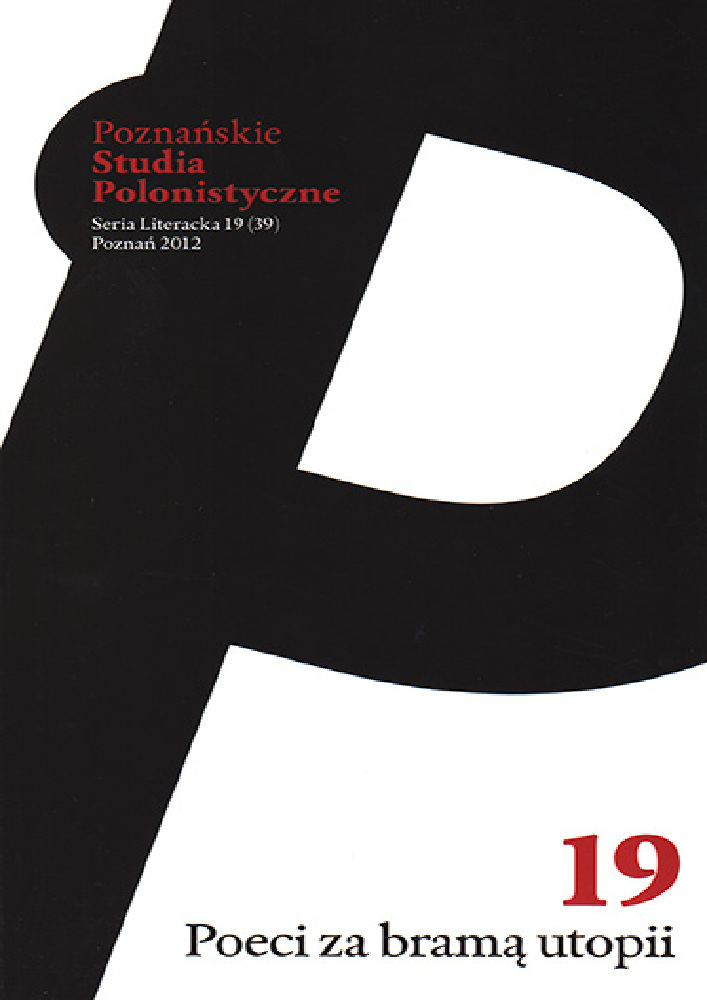Abstract
Condemning the hostile attitude of modern poets towards both the manifestations and the very idea of civilizational progress, Eliza Orzeszkowa, in her extensive article Listy o literaturze. Wiek XIX i tegocześni poeci written in 1873, and then Piotr Chmielowski in his Zarys literatury polskiej ostatnich lat szesnastu, illustrated their arguments with a number of poems, including the sonnet Dział pieśni by Leohnard Sowiński. R. Okulicz-Kozaryn starts with reminding his readers that the controversies over the right of poets to put themselves over society, formulate opinions and judgments of civilization and their attempts to promote such values as scientism or utilitarianism, had had a long tradition at the time. By embarking on it, however, Orzeszkowa and Chmielowski appealed to practices of a particular kind, namely to disregard completely the message of a poem and to focus on exploiting it only to support their own arguments. The author of the article analyses the mechanism behind this manipulation and claims that Orzeszkowa, followed by Chmielowski, had even removed some words from the poem that could have been interpreted by the then reader as a sign of affiliation to the acrificed part of his life for these values being sentenced to exile and the following social degradation for his participation in the freedom movement at the turn of the 1850s and 1860s. In the heat of the ideological struggle, Orzeszkowa and Chmielowski did not argue for their own belief and did not even enter into polemics with the most important message in the poem. The truth is that L. Sowiński did not question the civilizational march forward of the mankind but rather showed that, contrary to what the positivists claimed, utilitarianism was just an appetite for enjoying the achievements of progress and maximizing pleasure and was not its diving force, being more like a parasitic residue and a baggage.
References
Bryda W., [wstęp], w: L. Sowiński, Wybór poezji, Kraków 1922.
Bryl M., Cykle Artura Gottgera, Poznań 1994.
Chmielowski P., Pisma krytycznoliterackie, oprac. H. Markiewicz, t. 1, Warszawa 1961.
Chmielowski P., Poezje S., „Opiekun Domowy” 1875, nr 52.
Chmielowski P., Zarys literatury polskiej, Wilno 1881.
Copleston F., Historia filozofii, t. 8: Od Benthama do Russella, Warszawa 1989.
Czepulisa-Rastenisa R., „Klassa” umysłowa. Inteligencja Królestwa Polskiego 1832–1862, Warszawa 1973.
Du Camp M., Chants modernes, Paris 1855.
Du Camp M., Memoires d’un suicidé, Paris 1853.
Gomulicki J.W., Pegaz w jarzmie, czyli klucze do „Ciurów”, wstęp do: W. Gomulicki, Ciury. Powieść, tekst ustalił i objaśnił Z. Wasilewski, Kraków 1986.
Janion M., Żmigrodzka M., Romantyzm i historia, Warszawa 1978.
Miasto i cywilizacja urbanistyczna w liryce polskiej II połowy XIX wieku, Białystok 2009.
Okoń W., Sztuki siostrzane. Malarstwo a literatura w Polsce w drugiej połowie XIX wieku. Wybrane zagadnienia, Wrocław 1992.
Orzeszkowa E., Listy o literaturze. List I. Wiek XIX i tegocześni poeci, w: Pisma krytycznoliterackie, oprac. E. Jankowski, Wrocław–Kraków 1959.
Pichois C., Przypisy i komentarze, przeł. J.M. Kłoczowski, w: Ch. Baudelaire, Rozmaitości estetyczne, przeł. J. Guze, Gdańsk 2000.
Schiller L., Blallady, wyb. L. Lewin, przeł. W. Chłędowski, W. Lewik, Warszawa 1962.
Sowiński L., Poezje, t. 2, Poznań 1875.
Stempowski J., Chimera jak zwierzę pociągowe, wyb. i oprac. J. Timoszewicz, Warszawa 1988.
Świętochowski A., Pleśń społeczna i literacka, w: Programy i dyskusje literackie okresu pozytywizmu, oprac. J. Kulczycka-Saloni, Wrocław 1985.
Tomkowski J., Samobójcy i marzyciele. O zabijaniu poetów, Kielce 2002.
Wiślicki A., Groch na ścianę, w: Programy i dyskusje literackie okresu pozytywizmu, oprac. J. Kulczycka-Saloni, Wrocław 1985.
Zielińska M., Cmentarz [hasło], w: Słownik literatury polskiej XIX wieku, red. A. Kowalczykowa, J. Bachórz, Wrocław 1991.
License
Authors
Authors of texts accepted for publication in „Poznańskie Studia Polonistyczne. Seria Literacka” are required to complete, sign and return to the editor's office the Agreement for granting a royalty-free license to works with a commitment to grant a CC sub-license.
Under the agreement, the authors of texts published in „Poznańskie Studia Polonistyczne. Seria Literacka” grant the Adam Mickiewicz University in Poznań a non-exclusive, royalty-free license and authorize the use of Attribution-NoDerivatives 4.0 International (CC BY-ND 4.0)Creative Commons sub-license.
The authors retain the right to continue the free disposal of the work.
Users
Interested Internet users are entitled to use works published in „Poznańskie Studia Polonistyczne. Seria Literacka” since 2016, for non-commercial purposes only, under the following conditions:
- attribution - obligation to provide, together with the distributed work, information about the authorship, title, source (link to the original work, DOI) and the license itself.
- no derivatives - the work must be preserved in its original form, without the author's consent it is not possible to distribute the modified work, such as translations, publications, etc.
Copyrights are reserved for all texts published before 2016.
Miscellaneous
Adam Mickiewicz University in Poznań retains the right to magazines as a whole (layout, graphic form, title, cover design, logo etc.).
